This past week I've been in London and a friend of mine, Premila, invited me to join her at the annual Gurkha Cup day celebrations out in the town of Aldershot, a military town close to Guildford. The Gurkha Cup is an all-day soccer tournament that's been organized by the Tamu Dhee Association and held every year on the Sunday of the May Day bank holiday long weekend.
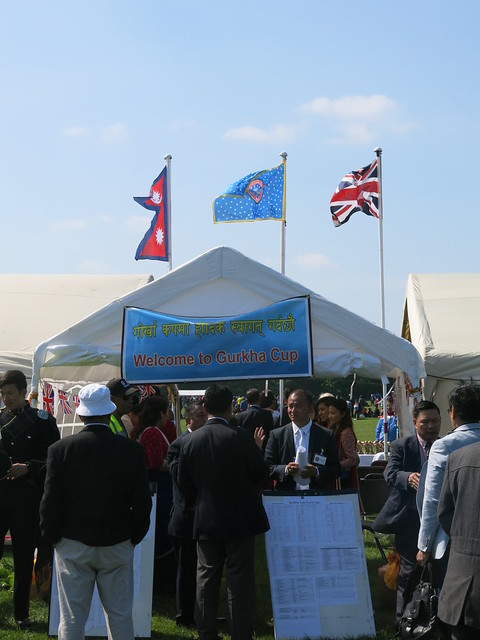
The event draws huge crowds. The vast majority of attendees are Gurkhas (both active and retired) and their families live around Aldershot, as well as in neighbouring towns such as Farnborough. Actress Joana Lumley was instrumental in fighting for the rights of retired Gurkha soldiers to settle in the UK, though this has not been without controversy.

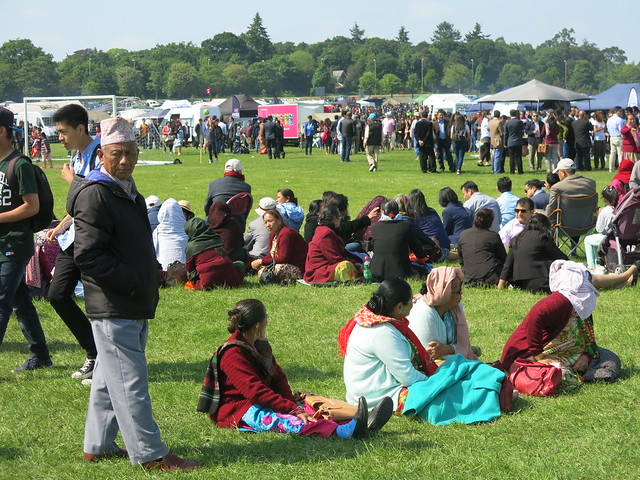
During the half-time show for the final game of the day between QGS Red and B13, we got to see the military band in action, as well as a demonstration of prowess with the traditional khurkuri knife. We didn't actually stay to watch the final, but I did see that Kent FC beat Ilam FC to win the Veterans tournament.
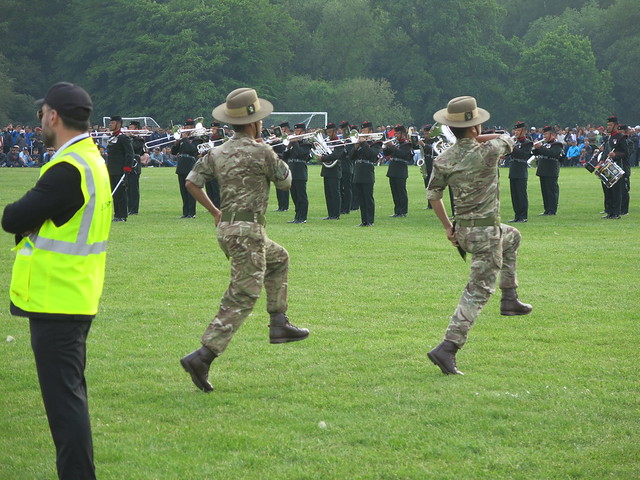
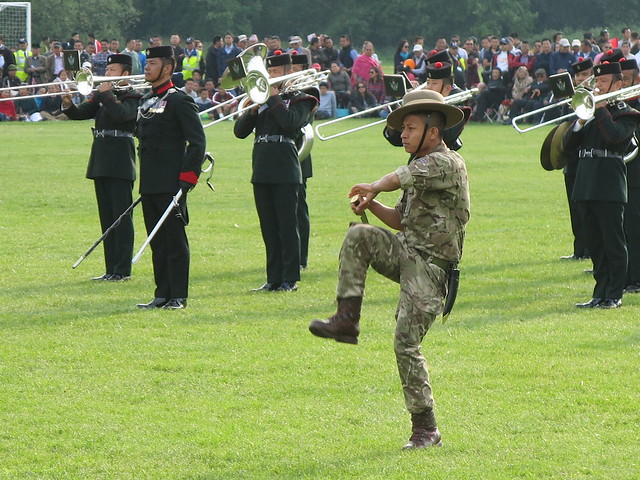
We spent of the time stuffing ourselves with food, especially momos (dumplings) from the Momo Station stall. This looked like the most popular food stall at the fair - the queue never seemed to disappear the whole time we were there! Owner Amit, whom Premila knew, was kind enough to pose for a picture.
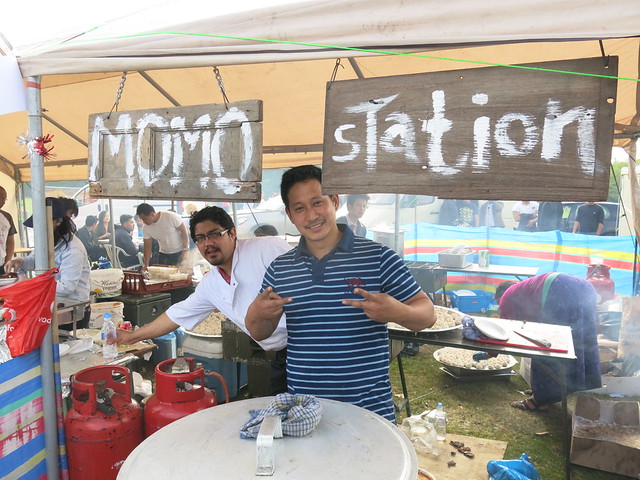
Check out the momos here!
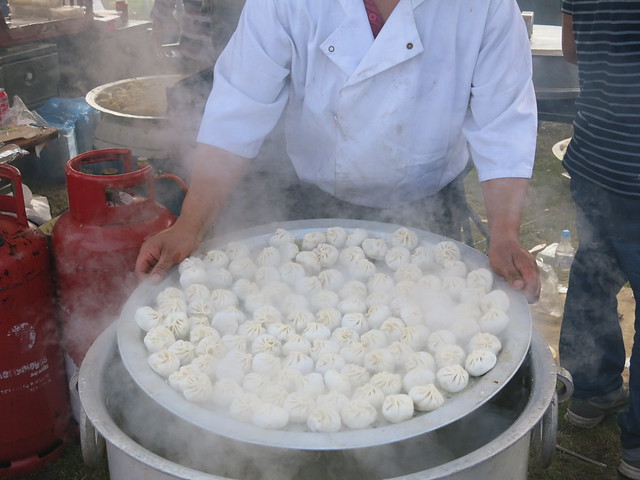
Premila was also busy pointing out things like the fact that a disproportionate number of Gurkhas and their families come from the indigenous or janajati groups of Nepal, e.g. Gurung, Magar, Rai (FYI, when I'm in Nepal, many people think I'm Rai). For example, in the census data cited in a handbook chapter by David Gellner titled "Warriors, Workers, Traders, and Peasants: The Nepali/Gorkhali Diaspora since the Nineteenth Century", it is estimated that Gurungs make up 22.2% of the Nepali population living in the UK, whereas back in Nepal they only represent 2.4% of the total population. It is also important to note that although Gurkhas speak Nepali, Nepali is not necessarily their first language, nor the main language used at home.
As a reminder of this, a poster we spotted (see below) features the figures Paruhang and Sumnima, who are pretty important to Kirat groups, but not to the dominant groups of the Kathmandu valley. In fact, you're probably more likely to spot this type of poster at an overseas Gurkha event, than in the shops of Kathmandu!
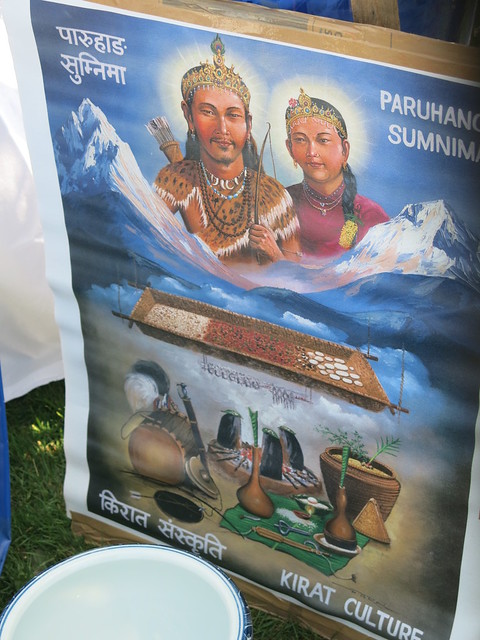
It was a great learning experience going to the Gurkha Cup with Premila. She's doing a PhD at the London College of Fashion on Nepali youth fashion in Britain and she's pretty familiar with the Nepalese community in and around London (her mother is also from Nepal). She was also able to highlight some of the fashion trends she'd seen over the years across the board, especially the UK Nepali obsession with Korean fashion (similar to NE India's embracing of all things Korean), Scottish tartans and long cardigans that can be worn over traditional lungis.
To find out more about such trends, check out the awesome PhD proposal video she made!
NEPALI STYLE | PHD PROPOSAL from Premila van Ommen on Vimeo.
One thing we did note was the lack of posters around Aldershot advertising the event. On our way back to the train station, a man curiously asked us what was happening in town. Maybe it would help if the organisers put up more posters, especially close to the railway station, so that more local residents knew what was going on.
And on a final note, I'm heading back to the States in a few days, but if you're around London at the end of August and interested in Nepal, the next big Nepali event will be the Nepali Mela 2016 at Kempton Park!

The event draws huge crowds. The vast majority of attendees are Gurkhas (both active and retired) and their families live around Aldershot, as well as in neighbouring towns such as Farnborough. Actress Joana Lumley was instrumental in fighting for the rights of retired Gurkha soldiers to settle in the UK, though this has not been without controversy.


During the half-time show for the final game of the day between QGS Red and B13, we got to see the military band in action, as well as a demonstration of prowess with the traditional khurkuri knife. We didn't actually stay to watch the final, but I did see that Kent FC beat Ilam FC to win the Veterans tournament.


We spent of the time stuffing ourselves with food, especially momos (dumplings) from the Momo Station stall. This looked like the most popular food stall at the fair - the queue never seemed to disappear the whole time we were there! Owner Amit, whom Premila knew, was kind enough to pose for a picture.

Check out the momos here!

Premila was also busy pointing out things like the fact that a disproportionate number of Gurkhas and their families come from the indigenous or janajati groups of Nepal, e.g. Gurung, Magar, Rai (FYI, when I'm in Nepal, many people think I'm Rai). For example, in the census data cited in a handbook chapter by David Gellner titled "Warriors, Workers, Traders, and Peasants: The Nepali/Gorkhali Diaspora since the Nineteenth Century", it is estimated that Gurungs make up 22.2% of the Nepali population living in the UK, whereas back in Nepal they only represent 2.4% of the total population. It is also important to note that although Gurkhas speak Nepali, Nepali is not necessarily their first language, nor the main language used at home.
As a reminder of this, a poster we spotted (see below) features the figures Paruhang and Sumnima, who are pretty important to Kirat groups, but not to the dominant groups of the Kathmandu valley. In fact, you're probably more likely to spot this type of poster at an overseas Gurkha event, than in the shops of Kathmandu!

To find out more about such trends, check out the awesome PhD proposal video she made!
NEPALI STYLE | PHD PROPOSAL from Premila van Ommen on Vimeo.
One thing we did note was the lack of posters around Aldershot advertising the event. On our way back to the train station, a man curiously asked us what was happening in town. Maybe it would help if the organisers put up more posters, especially close to the railway station, so that more local residents knew what was going on.
And on a final note, I'm heading back to the States in a few days, but if you're around London at the end of August and interested in Nepal, the next big Nepali event will be the Nepali Mela 2016 at Kempton Park!

